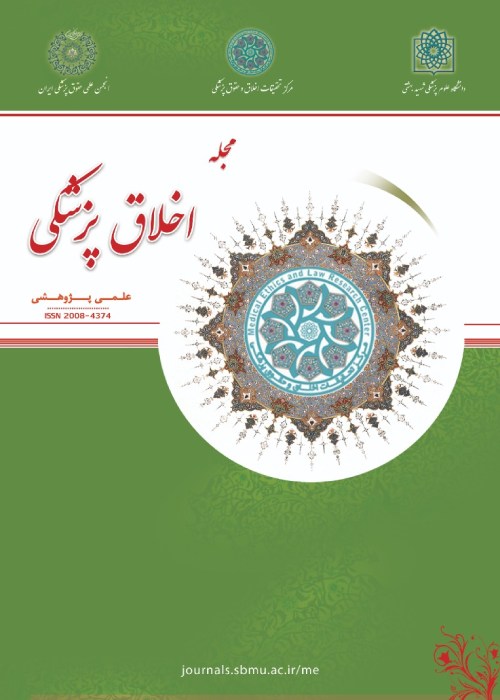Correlation between the Nurses, Moral Sensitivity and the Observance of Patient's Rights in ICUs
Author(s):
Abstract:
Background And Aim
Moral sensitivity is a feature that enables a person to recognize his moral conflicts and to understand the results of moral judgment about others. Since nurses are required to provide high quality care and ethics, they must have moral sensitivity to deal with ethical issues that are encountered during the care process. One of the examples of ethical care is to pay attention to the patient's rights and protect them. So that nurses are expected to make appropriate moral decisions in defense of their patient's rights. Nurses should pay attention to the patient's rights in addition to protect and improve their health. Considering the fact that this issue is more important in the ICUs and since observance of patient's rights is one of the aspects of moral care, this study aimed to determine the correlation between nurse's moral sensitivity and respect for patient's rights in ICUs in 2016.Materials And Methods
In this descriptive-correlational study, 260 nurses working in ICUs of hospitals affiliated to Tehran University of Medical Sciences were selected by available method. The criteria for entering the study were to have a bachelor's degree and above, and at least one year of work experience in the ICU. Transfer to the other part while collecting data was considered as a criterion for leaving the study. To collect data, the Lutzen's Moral Sensitivity Questionnaire and Researcher-made Patient's Rights Questionnaire were used. The Lutzen moral Sensitivity Questionnaire has 30 questions on the 7-point Likert scale and includes six areas of interpersonal and communication acquaintances, structure of moral concepts, benevolence, respect for patient autonomy, experience of conflicts and moral challenges, trust in specialized professional knowledge and principles of care.The Patient's Rights Observatory questionnaire was also a researcher-made tool based on the Patient's Rights Charter and Nursing Ethics Codes in Iran. The questionnaire consists of 30 questions in five-point Likert scale and it was designed in five areas of receiving health services, the patient's privacy and respect for the principle of privacy, the right to receive information in an appropriate and adequate manner, the right to choose freely to receive services and the right to access an effective complaints system. The validity of the questionnaires was evaluated through content and opinion polls from moral experts and its reliability was verified using a re-test. Correlation coefficient of the moral sensitivity questionnaire was r = 0.997 and patient's rights observation questionnaire was r = 0.986. Data were analyzed using SPSS 20 and statistical tests.
Ethical considerations: This research was approved by the Ethics Committee of Tehran University of Medical Sciences with 2015.2821 codes. Participation in the study was optional and informed written consent was obtained from nurses to participate in the study. In addition, the information confidentiality of the participants was observed.
Findings: The mean age of participants was 32.7 ± 6.38 years and their average work experience in the ICUs was 7.4 ± 5.6 with a range of 1 to 26 years. Most of the participants in the study were women and married. Most of them had a bachelor's degree and worked in the ICU. Approximately half of the nurses had a history of professional ethics education, and most of them mentioned the history of the patient's rights training course. The level of moral sensitivity of nurses in ICUs (160.58 ± 18.30) and respect for patient's rights by them (12.19±127.81) were higher than average. There was a direct significant relationship between the moral sensitivity of nurses and the degree of observance of patient's rights in ICUs (P
Conclusion
According to the findings, the level of moral sensitivity of nurses in ICUs was higher than the average. This finding is consistent with most studies. There are, of course, studies that highlight the nurse's moral sensitivity at a low level. The result of these differences suggests that various factors are likely to be involved in the moral sensitivity of nurses, including the conditions of the work environment and clinical environment, age and attitude of people towards the profession, culture, educational level, ethics education, nursing care volume and number of patients under care. The results of this study showed that the average observance of patient's rights by nurses was higher than average, but not desirable. The results of other studies are consistent with our study. High work pressure and shortage of manpower, lack of sufficient time and lack of adequate knowledge, as well as specific constraints related to the work environment, including working hours and communicational environment have been considered as barriers for observing patient's rights.Nurses and other staff in the treatment team should provide health care services with respect for human dignity and taking into account the characteristics of each patient, regardless of their economic, social and cultural status. Regarding the observed relationship between moral sensitivity and observance of patient's rights, it is suggested to adopt appropriate strategies to improve the observance of patient's rights in order to increase the level of moral sensitivity of nurses and provide high-quality care.
Keywords:
Language:
Persian
Published:
Journal of Medical Ethics, Volume:11 Issue: 40, 2017
Pages:
7 to 14
magiran.com/p1724814
دانلود و مطالعه متن این مقاله با یکی از روشهای زیر امکان پذیر است:
اشتراک شخصی
با عضویت و پرداخت آنلاین حق اشتراک یکساله به مبلغ 1,390,000ريال میتوانید 70 عنوان مطلب دانلود کنید!
اشتراک سازمانی
به کتابخانه دانشگاه یا محل کار خود پیشنهاد کنید تا اشتراک سازمانی این پایگاه را برای دسترسی نامحدود همه کاربران به متن مطالب تهیه نمایند!
توجه!
- حق عضویت دریافتی صرف حمایت از نشریات عضو و نگهداری، تکمیل و توسعه مگیران میشود.
- پرداخت حق اشتراک و دانلود مقالات اجازه بازنشر آن در سایر رسانههای چاپی و دیجیتال را به کاربر نمیدهد.
In order to view content subscription is required
Personal subscription
Subscribe magiran.com for 70 € euros via PayPal and download 70 articles during a year.
Organization subscription
Please contact us to subscribe your university or library for unlimited access!


